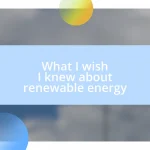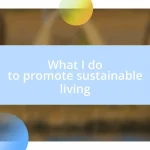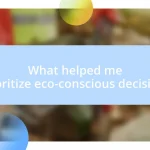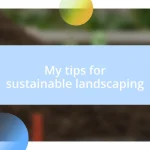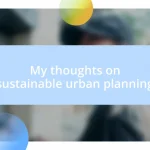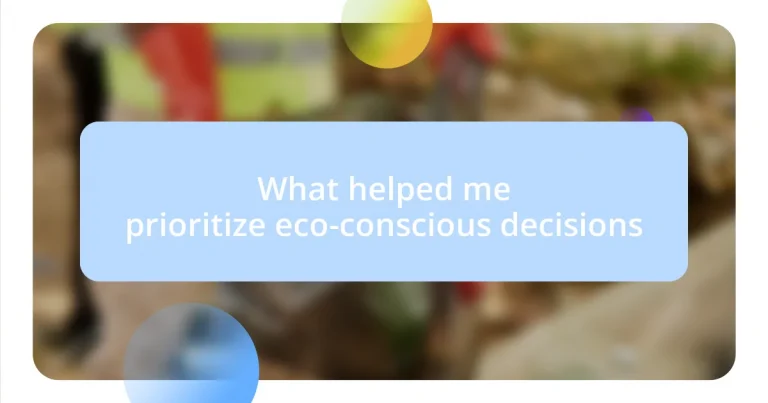Key takeaways:
- Eco-conscious living is a mindset that emphasizes mindful choices and small actions, such as opting for reusable bags or supporting local farmers.
- Establishing personal sustainability priorities, like reducing waste and supporting ethical consumption, helps align daily decisions with individual values.
- Tracking progress and sharing experiences with a community fosters motivation, reinforces commitment to sustainability, and encourages collective change.
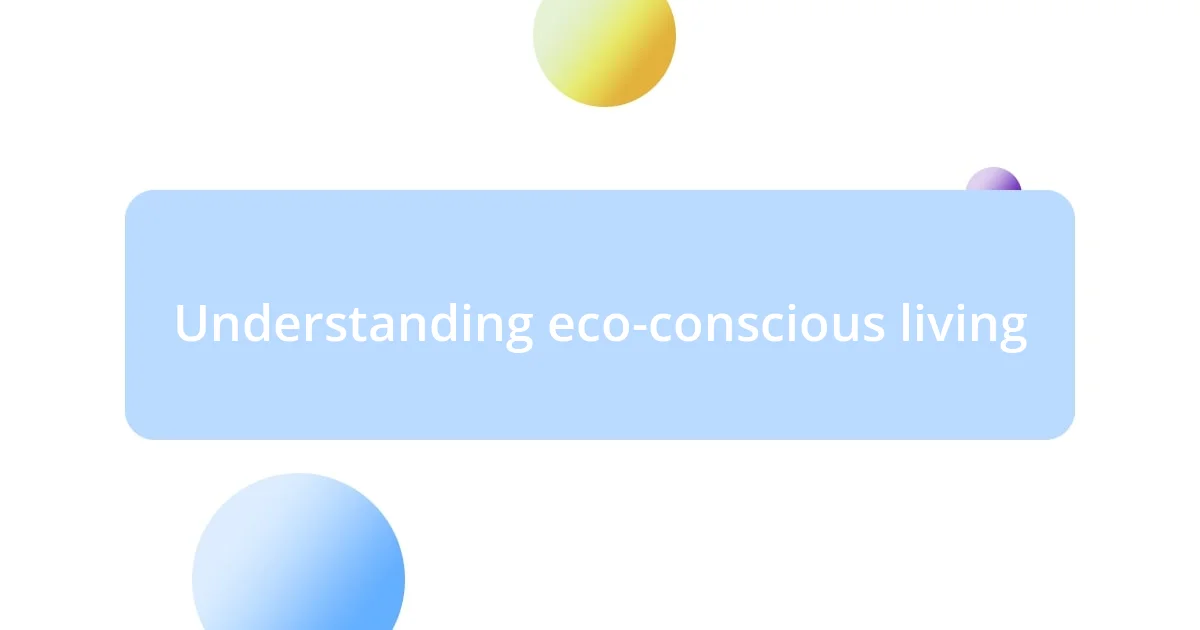
Understanding eco-conscious living
Understanding eco-conscious living goes beyond the choices we make; it’s a mindset that shapes our relationship with the environment. I still remember the moment during a hike when I encountered a stunning landscape—only to find plastic waste littered across the trail. How could people overlook the beauty of nature while contributing to its decay? That experience sparked a genuine desire to change my habits and advocate for a more sustainable lifestyle.
When I started making eco-conscious choices, I often faced dilemmas. Should I buy the trendy, packaged product or opt for a simpler, bulk item? I learned that sustainability isn’t solely about strict rules; it’s about mindful choices. It’s exciting to know that even small shifts, like choosing reusable bags or supporting local farmers, can contribute to a larger impact.
Embracing eco-conscious living often means reevaluating what “normal” looks like in our lives. I used to think that living sustainably required significant sacrifices. However, I’ve discovered that it’s quite the opposite! Finding joy in farmers’ markets or making my own cleaning products can be rewarding. This journey of awareness opens doors to a more intentional and fulfilling way of living. Isn’t it incredible how connected we can become to our choices and their impact on the earth?
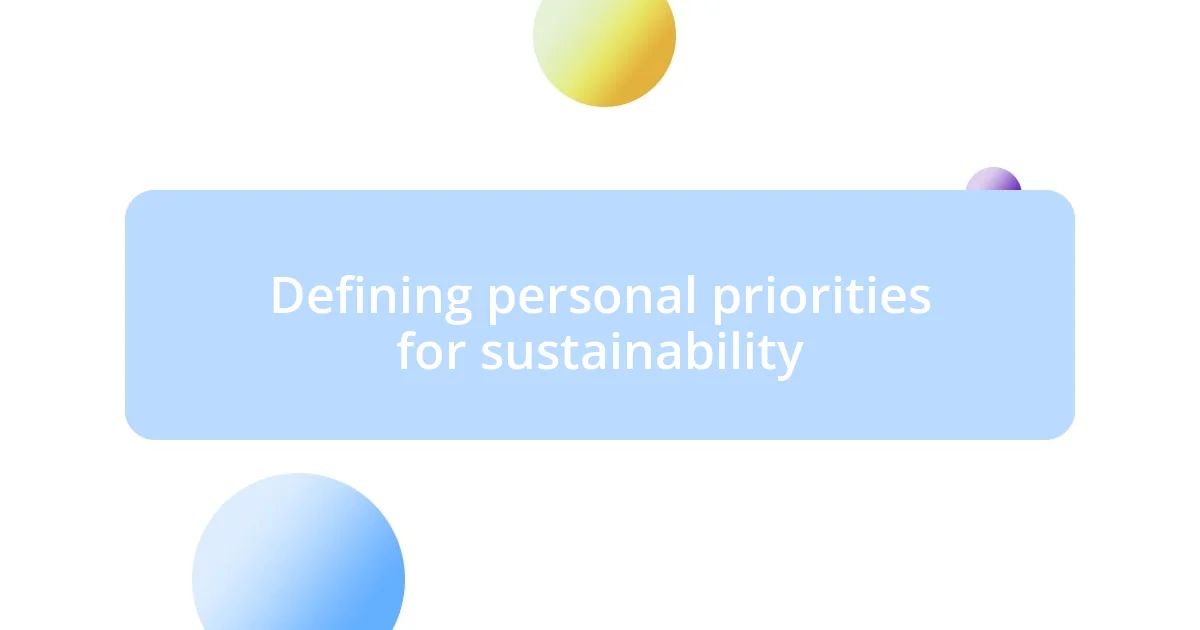
Defining personal priorities for sustainability
Defining personal priorities for sustainability is a deeply personal journey. I often reflect on my own choices and how they align with my values. For instance, after realizing the impact of fast fashion, I began prioritizing thrift shopping over buying new clothes. This not only reduced waste but also gave me the thrill of discovering unique pieces while contributing to a sustainable future.
When considering my sustainability priorities, I find myself weighing convenience against environmental impact. Have you ever grappled with whether to grab that quick takeout meal in plastic containers or to cook at home? I’ve chosen the latter more often lately, finding joy in meal prep and discovering new recipes. It’s a simple act that reinforces my commitment to reducing waste, while also nurturing my love for cooking.
Establishing these eco-conscious priorities has been enlightening. I’ve learned to celebrate progress rather than perfection. Each small step feels like a victory, such as choosing to bike instead of drive for nearby errands. This shift has not only minimized my carbon footprint but also revitalized my appreciation for the surrounding community. How do your choices reflect your values?
| Priority | Example Action |
|---|---|
| Waste Reduction | Using reusable bags and containers |
| Ethical Consumption | Supporting local businesses |
| Energy Efficiency | Switching to LED lighting |
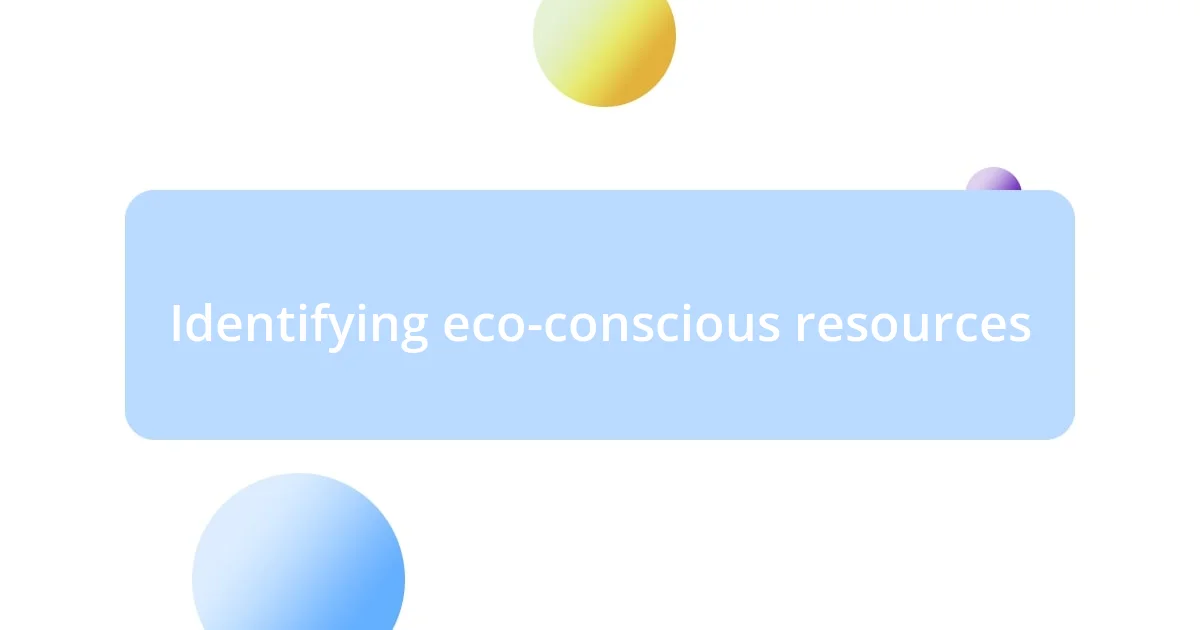
Identifying eco-conscious resources
Identifying eco-conscious resources can feel overwhelming at first, but my journey taught me to seek out reliable information and tools. One day, while researching sustainable brands, I stumbled upon a website that rated companies based on their environmental practices. It opened my eyes to a wealth of resources available to guide my choices, making eco-friendly shopping much more accessible.
Here are some valuable resources I’ve discovered along the way:
-
EcoRater: An online platform that evaluates and scores various brands on their sustainability practices.
-
Good On You: Focuses on ethical fashion, providing ratings for clothing brands based on their impact on the planet and labor practices.
-
Local Farmers’ Markets: A great way to find fresh, organic produce while supporting local agriculture and reducing transportation emissions.
-
Community Workshops: Attending workshops not only helps build skills for sustainable living, like composting or DIY cleaning products, but also connects you with like-minded individuals.
As I refined my resource list, I began enjoying the process more. Finding a community dedicated to these practices made me feel a sense of belonging. That discovery turned mundane shopping trips into exciting treasure hunts for eco-friendly products!
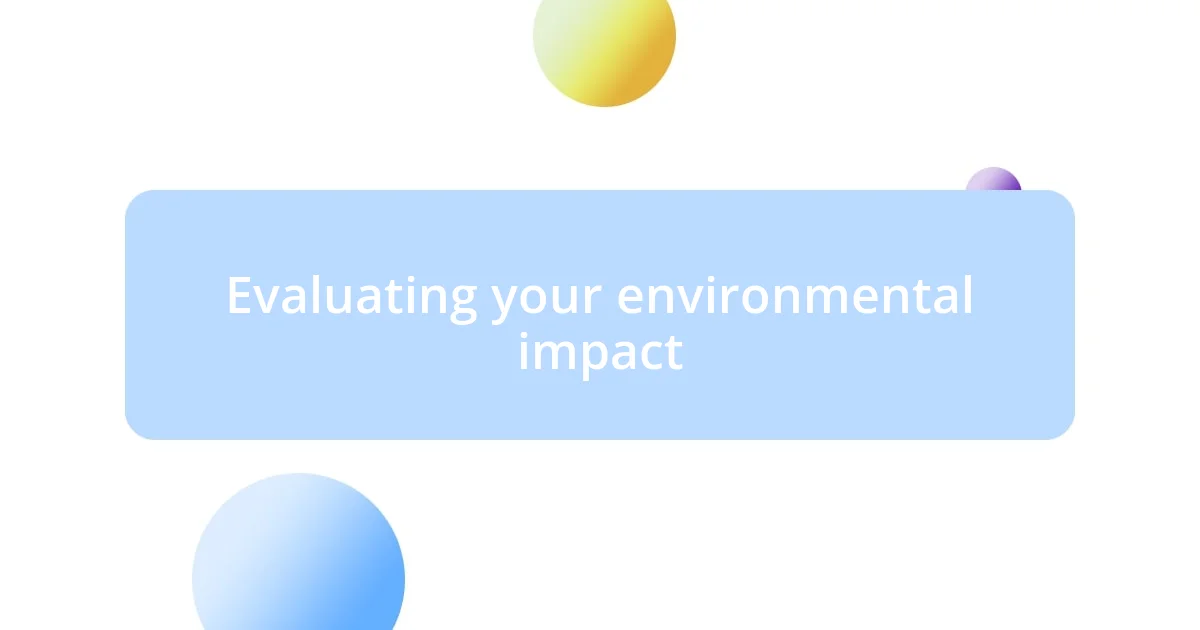
Evaluating your environmental impact
Evaluating my environmental impact has been a transformative experience. Recently, I took time to analyze my energy consumption at home and was shocked by the results. Seeing how many kilowatts I used during peak times nudged me to make changes, like unplugging devices when not in use. Why hadn’t I done this sooner? The realization hit me that small actions lead to significant environmental benefits.
I remember standing in my kitchen surrounded by my food choices: fresh fruits, organic vegetables, and those tempting pre-packaged snacks. One day, I decided to calculate the carbon footprint of each item. It was eye-opening to see how a simple switch from plastic-wrapped snacks to bulk purchases could dramatically reduce waste. This shift felt like gaining control over my choices, empowering me to make more mindful decisions. Isn’t it fascinating how knowledge can reshape our behaviors?
Evaluating my impact isn’t just about numbers; it’s about feelings too. I’ve experienced guilt when I see single-use plastics creeping back into my life. However, this guilt often transforms into motivation. I realized that every step I take towards sustainability helps me align my actions with my beliefs. So, have you ever taken a moment to assess your choices? Engaging with this reflection can spark meaningful change, leading you to discover a more sustainable version of yourself.
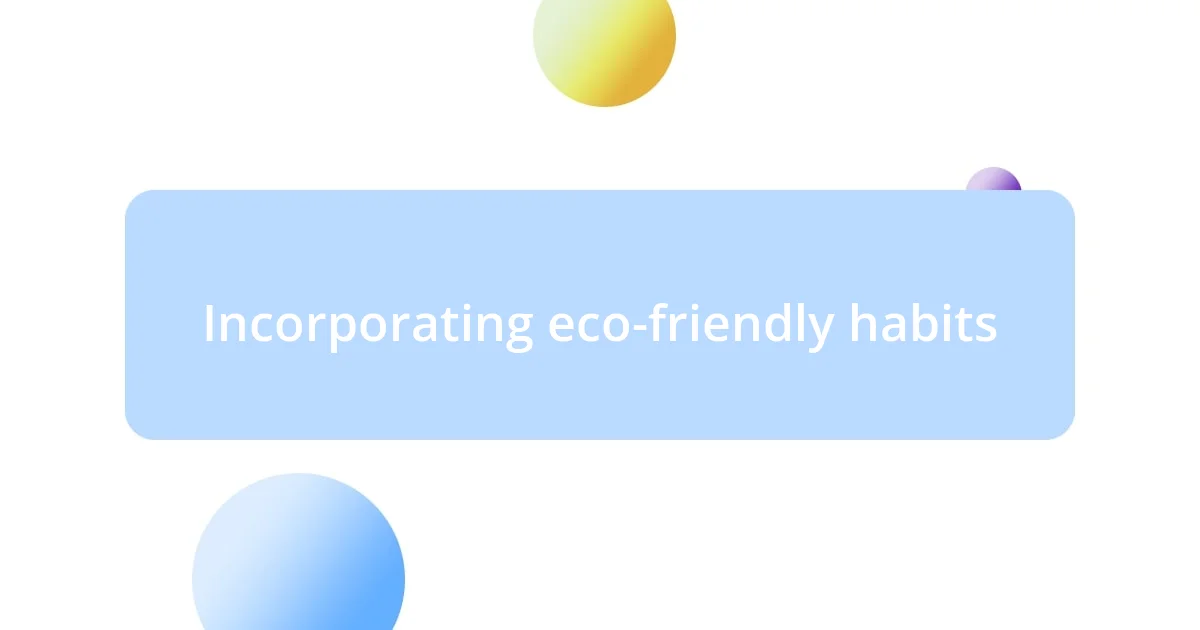
Incorporating eco-friendly habits
Incorporating eco-friendly habits into daily life doesn’t have to feel like a chore; it can be quite the adventure! I remember the first time I swapped out my usual products for eco-friendly alternatives. I walked into my local store with a list and left feeling empowered. Choosing a plant-based dish soap over my old favorite felt like a small win, yet it ignited a spark within me. Have you ever noticed how each decision can create a ripple effect? The more I adopted these habits, the more natural they became, like second nature.
I also found that celebrating small victories made a huge difference in my commitment to an eco-conscious lifestyle. For instance, I started carrying reusable bags everywhere. One day, after a grocery run, I felt a wave of satisfaction as I reflected on how much plastic I had avoided. Those little triumphs kept me motivated to learn more and do better. So, how can we make sure these efforts stick? I believe it’s all about creating a routine. Integrating simple practices like meal prepping using glass containers instead of plastic ones not only reduces waste but also encourages healthier eating habits.
Over time, I’ve discovered that it’s the community support that truly helps solidify these habits. Joining a local sustainability group opened doors to workshops and shared resources that made the journey feel inclusive. Imagine discussing zero-waste strategies with others who share your passion! I once participated in a neighborhood clean-up, and witnessing the immediate impact of our collective effort was incredibly uplifting. It made me realize that when we share our eco-initiatives with others, it amplifies our commitment and makes the path to sustainability feel less solitary. Isn’t it amazing how our actions can inspire others, creating a larger community of change?
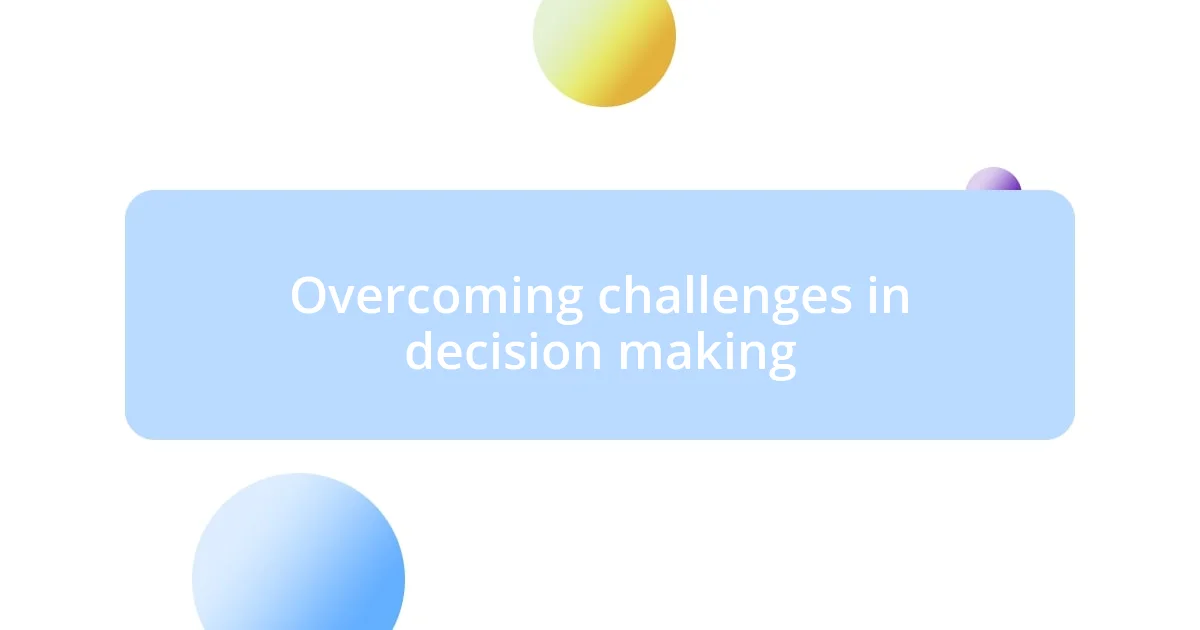
Overcoming challenges in decision making
Decision making can sometimes feel like a labyrinth, especially when faced with eco-conscious choices. I remember grappling with the dilemma of whether to invest in a more expensive, energy-efficient appliance. Initially, the higher upfront cost seemed daunting, but reflecting on the long-term savings and environmental benefits helped me shift my perspective. That moment taught me to look beyond the immediate challenges and consider the broader impact of my decisions.
One of the most challenging aspects I’ve faced in eco-conscious decision making is the overwhelming amount of information available. I often felt paralyzed by countless choices, unsure which path to take. My solution was to narrow my focus and establish core values that guide my decisions. For instance, I decided to prioritize local products to support community businesses while also reducing transportation emissions. This clarity not only simplified my decision-making process but also built confidence in the choices I was making.
I also encountered resistance from friends and family who didn’t fully understand my journey towards sustainability. I remember a dinner where I chose to bring my own containers for leftovers, and the initial awkwardness was palpable. But as I shared my reasons and the positive impact of reducing single-use plastics, they began to see things differently. This experience reminded me that education and open dialogue are key to overcoming challenges in decision making. Have you ever faced skepticism when trying to make sustainable choices? Engaging others in conversations about eco-consciousness can create a supportive environment, fostering growth for everyone involved.
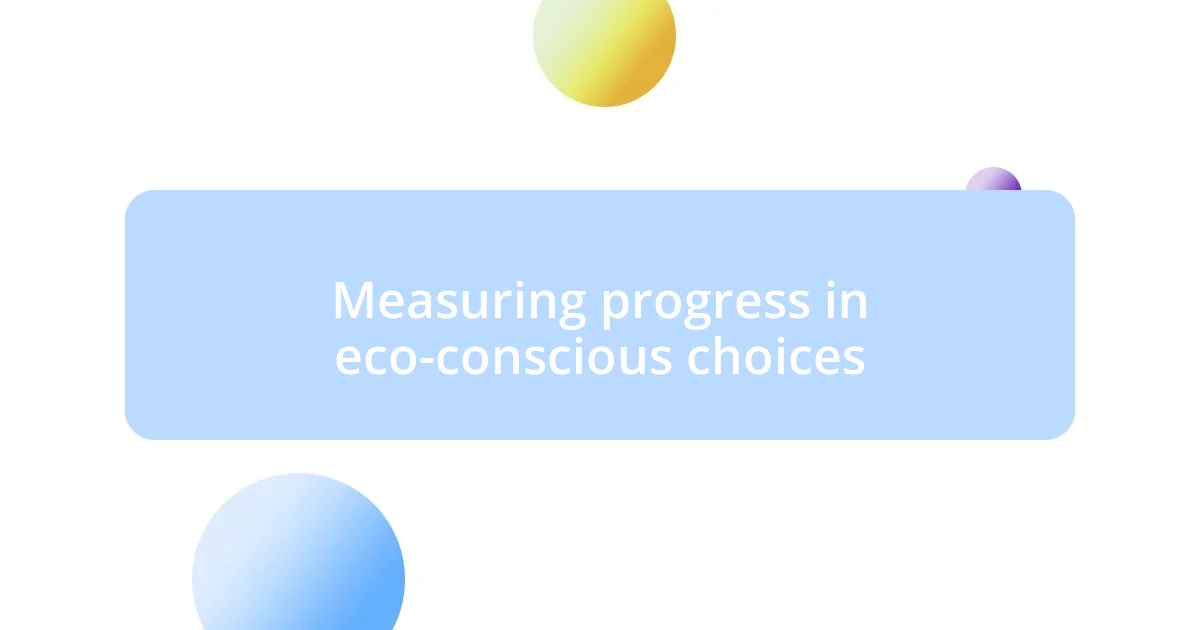
Measuring progress in eco-conscious choices
Measuring progress in eco-conscious choices can be surprisingly gratifying. I recently started keeping a journal to track my efforts, noting every small change I made, like bringing a reusable coffee cup to my favorite café instead of using disposable ones. One day, flipping back through the pages, I was struck by just how far I’d come—what seemed like a series of insignificant choices had collectively formed a tapestry of progress. Have you ever taken a moment to reflect on your journey? It’s worth acknowledging those milestones.
I also learned that using tangible metrics can enhance my awareness. For instance, I set a goal to reduce my waste by a certain percentage each month. Tracking my progress made me more conscious of my purchasing habits, from using bulk bins at the grocery store to carefully selecting products with minimal packaging. Each month, I’d crunch the numbers and celebrate those little wins, and you know what? It became a motivating factor! Have you ever gamified a personal goal? It’s an exhilarating experience when you can see your efforts reflected in tangible results.
Sharing my journey with friends reinforced my commitment, too. I set up monthly check-ins with a couple of pals who were also on their eco-conscious paths. We would discuss our successes and challenges, and I vividly remember the excitement during one of our meet-ups when one friend announced she had gone plastic-free for a whole week! I felt an immense sense of joy for her because it underscored the idea that our progress can inspire others. How does it feel to know your journey can influence others positively? It gives our choices a ripple effect that can reach far beyond our individual actions.


